Introduction
Housing a population of over 206million, Nigeria is the largest country in Africa by population and 7th in the world. Since independence, Nigeria has played a big brother role to other African countries leading the Pan-African goal and portraying the African image in the international community. Instances of this can be seen in the lead role played in Angola independence fight, central role in the establishment of ECOWAS and ECOMOG and end of apartheid regime in South Africa. Its influential role in the continent as well as its population earned it the ‘Giant of Africa’ title.
60 years down the road, the country which once rose head and shoulders above its peers has found itself in a dire situation. Soaring unemployment rate, large public debt, rising poverty rate, dilapidated infrastructures, insecurity among others. This exposition tries to carry out a comparative analysis between Nigeria and selected economies in Africa. South Africa in Southern Africa, Egypt from Northern Africa, Kenya from East Africa and our neighbour (Ghana) in the same West African coast.
State of the Nigerian economy among its peers
- Tax role in the economy
Tax is a major instrument in a government fiscal chest, a major source of government revenue used in financing its activities. Nigeria is one of the few countries in the world with low tax to GDP ratio. The figure below shows average tax to GDP ratio (2015- 2018)
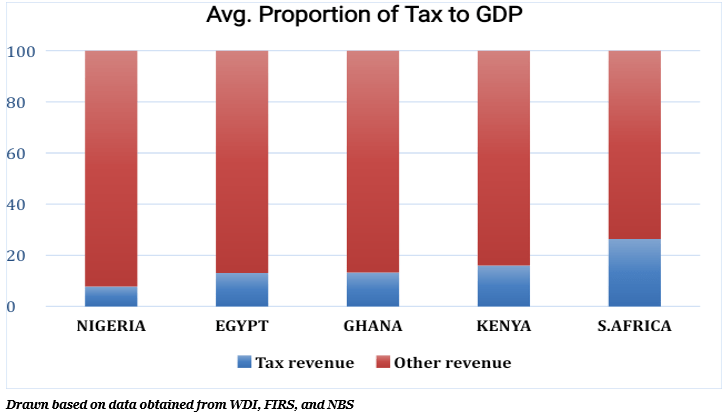
South Africa leads the line with 25% followed closely by Kenya (18%), Ghana (17%) and Egypt (15%). Nigeria with over 200million population and over 60% active working age, has 8%, the least ratio among these countries.
The above is a testimony to the fact that Nigeria’s taxing capacity is underutilized. Nigeria can generate more revenue from taxing its economic agents. However, citizens are more concerned about the over-duplication of various taxes, transparency of tax collection process, accountability of public funds, convenience and ease to pay these taxes. If citizens are guaranteed that their funds are properly utilized and the trust gap between the citizens and its political actors are bridged, citizens will willingly exercise their civic responsibility.
- Rethink its Educational system
“An organisation is as good as its human resources”, same as a nation. Citizens of the country largely determines the direction of the country. Education shapes the mind. Rot in the Educational system is alarming. Obsolete curriculum, inconducive learning environment, inadequate funding, archaic research facilities are issues plaguing today’s Nigeria educational sector.
The figure below shows the average literacy from 2015 through 2018.
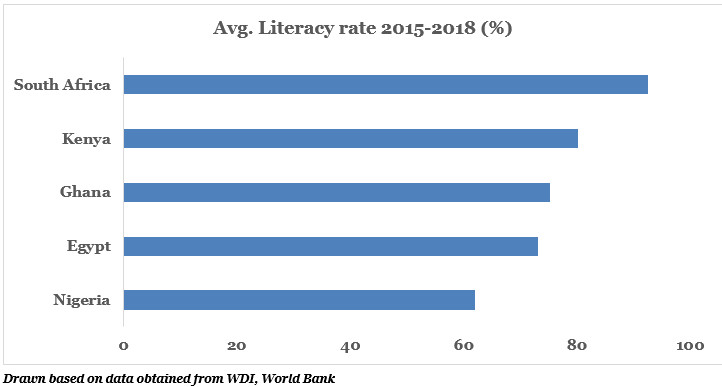
South Africa leads the line once again with 92% of its population able to read and write followed by Kenya’s 80%, Ghana 75% and Egypt 72%. Nigeria once again lags behind with about 62% literacy rate.
This figure calls for serious concern given the high rate of out of school children. This is a time bomb waiting to explode. A survey conducted by the United Nations Children’s Fund (UNICEF) indicates that the population of out of school children in Nigeria has risen from 10.5 million to 13.2 million in 2018, the highest in the world. Northern Nigeria accounts for the highest number of out-of-school children due to insurgency and terrorism in the region.
Nigeria’s budgetary allocation to education is abysmally low. In 2019 and 2020, only 7.02% and 6.7% respectively of the budget was allocated as against the UNESCO benchmark of 26%.
Nigerian political actors need to rethink their approach towards education, prioritising education is imminent if the country wish to change its fortune.
- Access to power supply
After 60 year of independence, epileptic power supply still plague the country. Nigeria currently generates around 4,000 Megawatts (MW) as against its potential to generate 12,555 according to USAID. This is compared to Ghana with a population of 30million and generates 4,000 MW, South Africa’s 51,309 MW, Kenya’s 2,370 MW and Egypt’s 24,700 MW. Nigeria generates less than the required Megawatts needed to power its population, yet it exports electricity to Togo, Niger Republic and Benin. The figure below shows the percentage of population that have access to power supply.
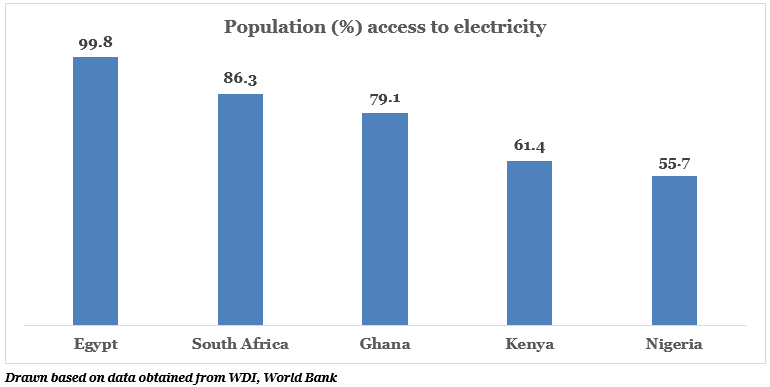
Egypt leads the chart with 99.8% translating that almost all citizens have access to power supply. Following Egypt closely are South Africa (86%), Ghana (79%) and Kenya (61.4%). Nigeria clearly sits at the bottom of the chart with about 55.7% of its population having access to power supply.
Studies have shown that there’s a positive correlation between supply of electricity and economic growth. Constant power supply stimulate economic activities, reduces the cost of operation, hereby driving prices down and propelling economic growth. The figure below shows the number of days (on average) required to get access to power supply
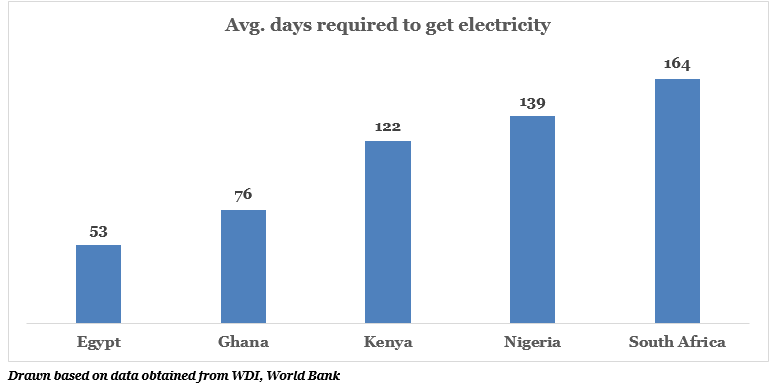
Egypt leads the line once again with 53 days (appr. 2months) to get connection to power in the country. On the average, it takes 76 days (2months, 2 wks) to access electricity in Ghana, followed closely by Kenya 122 days, Nigeria 139 days and lastly South Africa 164 days. Any nation seeking to attract foreign investment needs critical infrastructure in place. Aside security of life and property, access to constant power supply is sacrosanct. Is the privatisation of the power sector paying off? Does the government retract its action and re-aquire its ownership rights in this sector?
- Human Capital Index
This measure, prepared by the World Bank shows how countries mobilize the economic and professional potentials of its citizens. Ranging from 0-1, it shows the level of productivity and human capital potential of a country. The closer the index is to 1, the better the country is at utilizing its human resource as against 0 which shows otherwise.
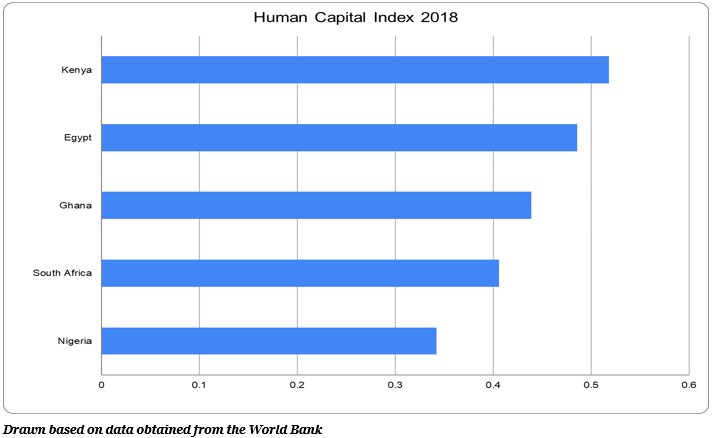
The figure above shows Human Capital Index (HCI) with Kenya 0.52 leading the line. Egypt followed with 0.49, Ghana 0.44, South Africa 0.41 and Nigeria 0.34. Nigeria sits at the bottom of this rank once again with an index below 0.4. Nigeria occupies position 152 out of 157 in global ranking also below crisis rocked countries like Afghanistan (133/157), Yemen (145/157). This shows how bad the country is in utilizing its human capital, capital and productivity lost from underutilizing its human capital resource.
Conclusion
With Nigeria’s average population growth rate of 3.25% annually and a population estimated to reach 405 million by 2050, radical reforms in its approach to governance needs to take place.
Out of the metrics used in measuring Nigeria’s relative position among its peers, it is obvious that the country is lagging far behind. Our volatile economic environment, lack of access to constant power supply, growing recurrent expenditure, high debt profile and most importantly corruption have contributed largely to this current state.
Above all, the chief will to rescind this current trajectory is the political will. Nigerian political gladiators from the federal, state and local government needs to converge at a consensus of bettering the life of its citizens, that’s the only way the country can manifest its potential and attain the desired level of economic development.
For questions, opinions, corrections and contributions, please drop them in the comment section. You can as well contact the writer on Twitter @SheriffHolla
Additionally, should you need data backed research and analysis for your business or research needs, you can contact us by sending a mail to info@giftedanalysts.com
